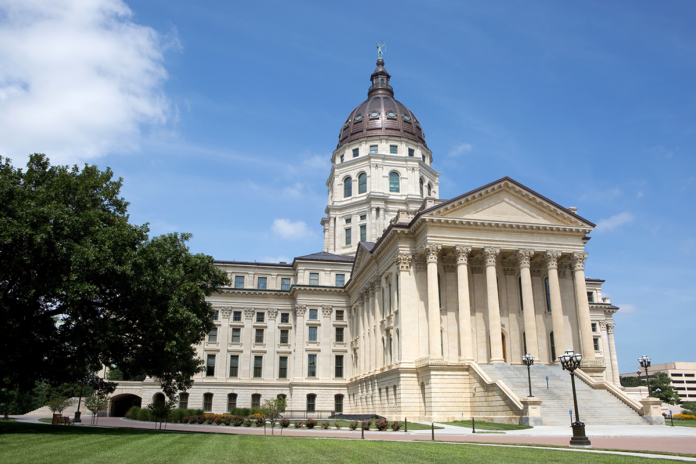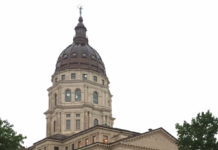Gov. Laura Kelly’s administration on Wednesday opened up a line of attack against the Republican Senate plan for expanding Medicaid.
In what might have been the first of many skirmishes, the governor’s budget director raised a series of questions about the Medicaid plan designed by Majority Leader Jim Denning.
Addressing the special joint committee on Medicaid expansion, Larry Campbell characterized parts of Denning’s plan as financially risky, expensive and fraught with unknowns.
He presented the committee with an analysis of both the Senate proposal and the plan passed by the House last session.
Campbell said his office’s ability to assess the Senate plan was “challenging,” partly because of the complex nature of the proposal, which is still in draft form.
“The plan makes broad financial assumptions, many of which have never been approved by (the federal government) or come to fruition in other states,” Campbell told the committee.
He expressed more confidence in his evaluation of the bill passed last session by the House and supported by the governor. It is estimated to cost about $34 million a year.
He drew a sharp rebuke from Denning, who accused the budget director of making a political calculation on behalf of the governor, who backs a rival plan passed by the House last session.
“To come in and have all this political stuff — I just think it’s nonsense,” Denning told Campbell.
Denning ripped into Campbell for saying that the Senate proposal to partially expand Medicaid would cost the state $221 million while covering far fewer patients than full expansion.
Denning lashed out at Campbell for ignoring that the Senate plan counts on a 90% match from the federal government, the same as the plan passed by the House and supported by the governor.
“You have taken the political route, and you’ve given us some very misleading information that needs to be corrected,” Denning said.
“How more clear do we have to be that the Senate position is (a) 90/10 match only? If (the federal government) doesn’t approve it, we go on to full expansion. Pretty darn simple,” Denning said.
“I don’t appreciate this kind of political stuff, especially coming from you,” he told Campbell.
Campbell said he felt good about his testimony and that he would respond to Denning in writing.
Campbell’s analysis was the Kelly administration’s first detailed critique of the Senate Medicaid expansion plan since it was revealed last month.
The governor had previously criticized the Senate’s plan in broad strokes, saying the state didn’t need more bureaucratic red tape, increased taxes or hurdles limiting access to health care.
Denning is proposing to expand Medicaid to people earning up to 100% of the poverty level with an option of going to 138% if the original plan is not approved by the federal government.
The House bill, on the other hand, is a straight expansion of Medicaid up to 138% of the federal poverty level.
The Senate plan seeks a 90% federal match even if Kansas only expands to 100% of the federal poverty level, something skeptics think is unlikely.
Denning’s plan also aims to allow anyone earning between 100% and 138% of the poverty level — an estimated 30,000 people — to stay on the exchanges established by the Affordable Care Act while securing the 90% federal match.
Taxes on cigarette and vaping products would fund a reinsurance program for companies offering insurance on the exchanges in an effort to bring premiums down.
In his analysis of the Senate plan, Campbell questioned the reinsurance program, saying it would be risky to tie it to expanding Medicaid.
“From a budget lens, attaching a reinsurance program to this bill raises the most concern,” Campbell said.
“After spending my career as a banker, I pay special attention to risk when new state investments are proposed,” he said.
Campbell said the price for reinsurance has varied nationally, from $59.6 million in Maine to $271 million in Minnesota.
“The only way to develop a reliable cost estimate for a reinsurance program is to conduct an in-depth actuarial and economic analysis,” he said. “This has not occurred in Kansas.”
The Department of Insurance would assemble the application for the reinsurance program. It is reluctant to assess the Senate proposal until there is an actual bill. The Senate has a draft of a bill, which Denning said Campbell should have considered.
“Just ignoring it makes no sense to me,” he said of the draft.
Campbell said he had not ignored the draft.
He said the state health department is providing the Senate with numbers to form the plan and the Insurance Department is waiting on a bill to be introduced.
“Until a bill is introduced, there is no a fiscal note yet,” he said. “Everyone’s doing their best to try and provide good, accurate numbers.”
Insurance officials say they don’t yet have the legal authority to start the actuarial analysis of the Senate bill and have expressed concern about how the study would be funded.
Denning has suggested using surplus revenue in the legislative budget because the session ended early this year.
Twelve states have approved reinsurance plans like the one the Kansas Senate is proposing.
Colorado, Delaware, Montana, North Dakota and Rhode Island will implement reinsurance programs next year.
Testimony from the Kansas Health Institute on Tuesday said reinsurance programs in other states have lowered insurance premiums on the exchange by as little as 8% (Oregon) and by as much as 30% (Maryland).
Other lawmakers joined Denning in rebutting Campbell’s overall analysis.
Republican state Rep. Troy Waymaster questioned Campbell’s report claiming that Medicaid expansion would create 13,000 new jobs by 2021 and generate $30 million in annual tax revenues.
“Is there any way to gauge what the economic growth would be actually to the state of Kansas?” Waymaster said.
“Really, it’s just conjecture of what the economic growth would be. We really don’t know what it would generate for the state of Kansas.
“We don’t really know what the economic growth is going to be. Is that a fair statement?” Waymaster asked.
Campbell’s response:
“That is absolutely a fair statement.”















